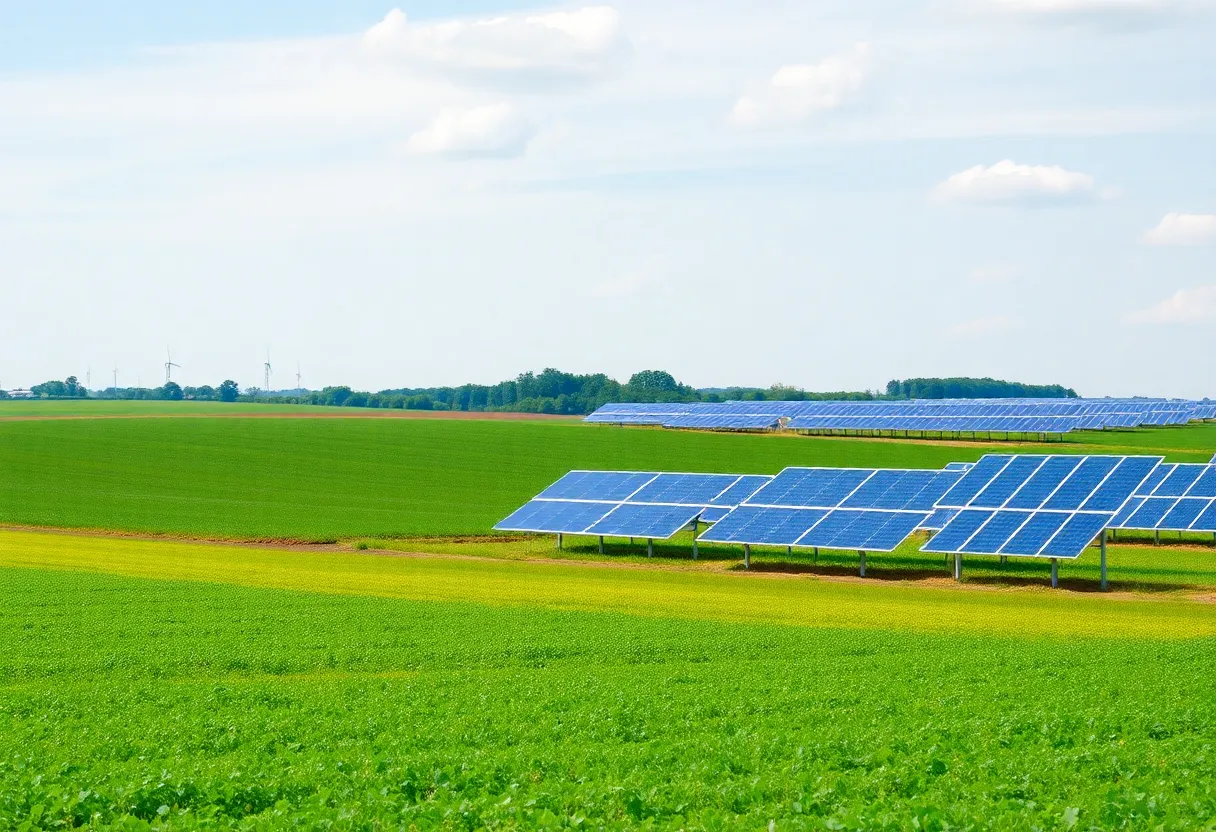News Summary
Lexington’s Mayor has expressed significant concerns regarding a proposed solar farm project by East Kentucky Power Cooperative (EKPC) that would convert 387 acres of prime farmland into an energy site. While the project aims to generate enough energy for approximately 4,560 homes, the Mayor highlights the loss of valuable agricultural land and minimal job creation as critical issues. As local debates continue, the community seeks a balance between renewable energy and farmland preservation.
Lexington Mayor Raises Concerns Over Solar Farm Project
In recent discussions surrounding a proposed solar farm in Fayette County, Lexington’s Mayor has voiced notable concerns about the project’s impact on the city’s prime farmland and overall economic health. The plan from East Kentucky Power Cooperative (EKPC) seeks to convert 387 acres of agricultural land into a solar energy site, prompting debate among community members and experts alike.
A Closer Look at the Proposal
The solar farm, as proposed by EKPC, aims to install nearly 88,000 solar panels generating 40 megawatts of energy. This energy would serve around 4,560 homes, which may sound appealing at first. However, Mayor Linda Gorton emphasizes that such a project would remove valuable farmland from production while only providing minimal job opportunities. The overall estimated cost of this venture is about $102 million.
Lexington’s Sustainable Growth
Lexington is a city on the rise, recently acknowledged for its impressive economic growth of 5.5%, the highest in the Cleveland Federal Reserve Region. With a thriving population of 322,000 and a record employment level of 174,328, the city’s economic landscape is vibrant and crucial to its identity. An impressive agricultural sector contributes a whopping $2.3 billion annually to Lexington’s economy, underscoring the importance of preserving farmland.
Mayor’s Perspective on Sustainability
Mayor Gorton has pointed out that the comments from EKPC’s CEO suggest a misunderstanding of Lexington’s unique economic environment and complexities. Concerns were raised regarding the compatibility of the EKPC’s solar farm with Lexington’s own sustainability initiatives like “Empower Lexington.” To the mayor, opposing a project that would compromise farmland while advocating for sustainability seems contradictory and indicates a narrow understanding of local issues.
A Different Approach to Solar Energy
Interestingly, while opposing the large-scale solar farm on prime farmland, the mayor is open to exploring solar energy solutions in other areas, such as on the city’s Haley Pike Landfill. This site is deemed non-productive, presenting an opportunity to harness solar energy without sacrificing agricultural land that contributes to local livelihoods.
Public Sentiment and Community Concerns
Community members have expressed significant concern over the project, emphasizing the need to protect farmland integrity. Many argue that solar panels, despite their benefits, cannot replace productive agricultural land. During a recent information session, these sentiments were echoed as residents sought clarity on the potential industrialization of areas surrounding the proposed solar project.
Competition for Land
Adding to the complexity of the issue, another private firm, Silicon Ranch, has also proposed a solar project that could take up to 800 acres adjacent to the EKPC site. As these developments unfold, the community remains deeply invested in the conversation about balancing renewable energy with the preservation of fertile land.
Future Approvals and Regulation
For EKPC’s solar farm to proceed, it requires approval from the Public Service Commission and may bypass city zoning regulations, while Silicon Ranch’s project needs to gain the go-ahead from the city’s planning commission. As discussions and plans develop, local leaders and community members will continue to collaborate and raise awareness, prioritizing the city’s agricultural treasures.
As Lexington navigates this proposed solar initiative, the overarching hope is to find a viable path that harmoniously blends renewable energy needs with the essential protection of invaluable farmland. All eyes will be on how this conversation evolves, aiming for sustainability that truly benefits the people and the land.
Deeper Dive: News & Info About This Topic
HERE Resources
Lexington-Fayette County Advances Urban Planning Initiatives
heART Show in Georgetown Rescheduled for February 24
Lexington Mayor Gorton Presents Future Goals in State of the City
Kentucky General Assembly Begins 2025 Legislative Session
Lexington Faces Development Boom and Community Backlash
Interstate 75 Reopens After Collision Near Paris Pike Exit
Fayette County Faces NTI Day on January 13 Due to Hazardous Roads
Solar Power Projects Get Approval in Kentucky
Lexington Marks 250 Years with Pam Miller’s Legacy
Kentucky Approves Major Solar Projects
Additional Resources
- LEX18: New Solar Farm Approved in Fayette County
- Kentucky.com: Op-Ed on Solar Project
- WKYT: Neighbors Address Potential Solar Farm
- Spectrum News: Solar Farm Project Pushback
- The Crimson: Cambridge Lexington Land Purchase
- Wikipedia: Solar Energy
- Google Search: Solar Farms Impact on Farmland
- Google Scholar: Solar Energy and Agriculture
- Encyclopedia Britannica: Solar Energy
- Google News: Solar Projects in Kentucky







